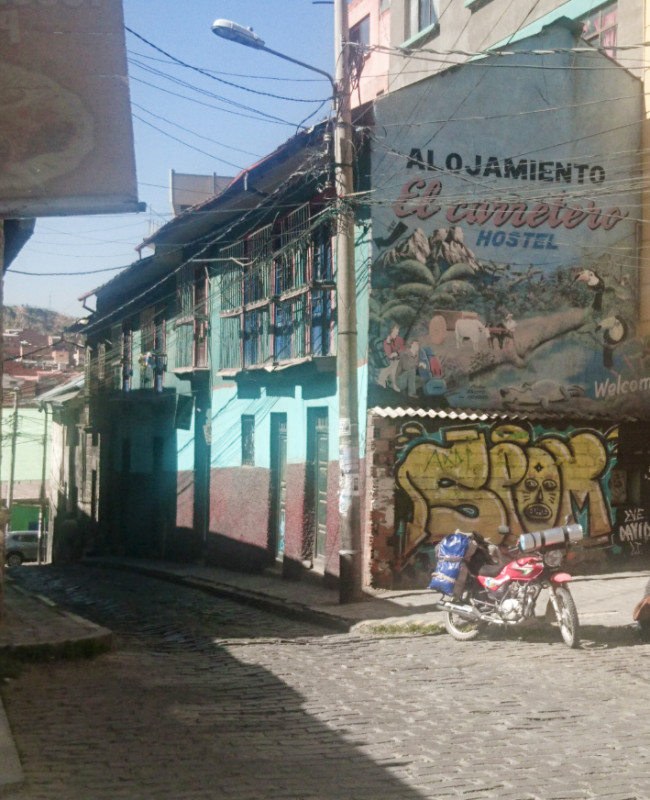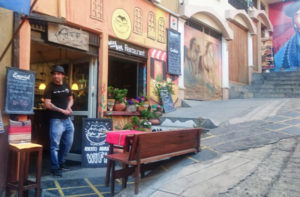 FINDING EXCUSES TO stay in La Paz wasn’t difficult. The WiFi drought in Coroico gave me some catching up to do online. The Higher Ground Cafe became a sanctuary of warmth, inspiration and productivity in the daylight hours. Even so, the evening cold was beginning to bother me in the hostel. I would kick off my boots tuck myself under the blankets with the hood up on my coat and either read, write, surf or watch a movie until I was tired enough to sleep.
FINDING EXCUSES TO stay in La Paz wasn’t difficult. The WiFi drought in Coroico gave me some catching up to do online. The Higher Ground Cafe became a sanctuary of warmth, inspiration and productivity in the daylight hours. Even so, the evening cold was beginning to bother me in the hostel. I would kick off my boots tuck myself under the blankets with the hood up on my coat and either read, write, surf or watch a movie until I was tired enough to sleep.
My hesitancy for departing for Cochabamba was for two reasons. One was that my Aduanas Nacional permit was expiring in a week and the other was that the journey meant a potential night camping out on the bleak, cold, windy Altiplano.
A far easier choice to stay in La Paz one more night, and another, and another…
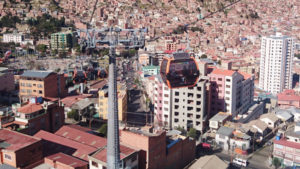 My SOAT insurance from Peru for the bike had expired and a lead for renewal took me to Calacoto, on the advice of Mark from Higher Ground. I didn’t mind the journey since it was a series of legs along the Teleferico, Orange, White, Sky Blue and Green all the way to the end at Irpawi and a walk towards Los Pinos. If La Paz was a Monopoly board, Los Pinos would probably be in the Dark Blue set at the top end. Strangely, it felt warmer down this end too, the opposite side to the chilly El Alto.
My SOAT insurance from Peru for the bike had expired and a lead for renewal took me to Calacoto, on the advice of Mark from Higher Ground. I didn’t mind the journey since it was a series of legs along the Teleferico, Orange, White, Sky Blue and Green all the way to the end at Irpawi and a walk towards Los Pinos. If La Paz was a Monopoly board, Los Pinos would probably be in the Dark Blue set at the top end. Strangely, it felt warmer down this end too, the opposite side to the chilly El Alto.
After a fruitless search for the SOAT office, practising my Spanish with bank staff and doormen consoling myself with a cappuccino and chocolate cake, I discovered a helpful guy at a Yamaha dealer. Motorbike sales: he should know. Univida.s.a at Camacho back in the centre of La Paz. I’d go there tomorrow… no rush…
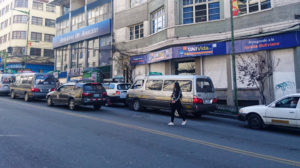 Univida s.a. We had communication problems but hammered out some sort of understanding using language going back to the stone age. No international insurance possible for foreign vehicles, although he gave me a piece of paper that looked like cover in Bolivia until December. I’d check with the Embassy, tomorrow… no rush…
Univida s.a. We had communication problems but hammered out some sort of understanding using language going back to the stone age. No international insurance possible for foreign vehicles, although he gave me a piece of paper that looked like cover in Bolivia until December. I’d check with the Embassy, tomorrow… no rush…
British Embassy. I press the buzzer on the gate. “Si?” “Habla Ingles?” “No!” A slight pause, the gate buzzes and I walk through and set off the alarm in the metal detector between the gate and the reception. The alarm is ignored by both 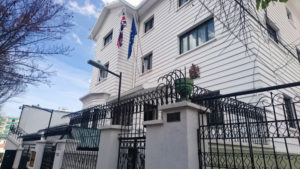 me and the security guard. After a conversation mentioning “no comprendo” and “Manchester United” I’m offered the reception phone and speak to an Englishman and get directed to the Vice Consul on the third floor. She calls La Positiva, the Peruvian insurance company, who tells her that I should arrange insurance online and I leave with a URL written on the back of her business card… it doesn’t seem to be a big deal since 30 days SOAT free immunity is granted in Bolivia.
me and the security guard. After a conversation mentioning “no comprendo” and “Manchester United” I’m offered the reception phone and speak to an Englishman and get directed to the Vice Consul on the third floor. She calls La Positiva, the Peruvian insurance company, who tells her that I should arrange insurance online and I leave with a URL written on the back of her business card… it doesn’t seem to be a big deal since 30 days SOAT free immunity is granted in Bolivia.
Thursday comes and I attempt to renew the temporary import permit for the bike at Aduana Nacional, La Paz. “No, you have to go to the airport at El Alto.”
Friday comes and I take the Orange then Red Teleferico to El Alto plus a taxi to the airport. Nobody speaks English but I get the message: “You have to renew your tourist visa at immigration.” “Here at the airport?” “No, down in La Paz. Oh and we need to see your bike.”
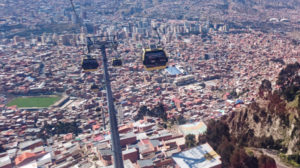 I walk three kilometres to the Yellow Teleferico on the rim of El Alto, which gets me closest to the immigration office, and pause for lunch overlooking the cityscape of La Paz. Does it really matter, spending all this time chasing paper? What else would I be doing? It’s all part of the adventure so not worth getting irritated about… these series of unfulfilled expectations. Embrace the uncertainty is what Susan Jeffers says in her book. Why not, let’s call it adventures in bureaucracy?
I walk three kilometres to the Yellow Teleferico on the rim of El Alto, which gets me closest to the immigration office, and pause for lunch overlooking the cityscape of La Paz. Does it really matter, spending all this time chasing paper? What else would I be doing? It’s all part of the adventure so not worth getting irritated about… these series of unfulfilled expectations. Embrace the uncertainty is what Susan Jeffers says in her book. Why not, let’s call it adventures in bureaucracy?
Migraciones is packed and my spirit sags a little with the prospect of an extended wait. I approach the information counter and the girl says “Renewal, go through that door and turn left.” “Now?” “Yes.” I see the keeper of the rubber stamp and answer a simple question with “Si. Turismo!” and within ten minutes, I’m back on the street with a new thirty-day stamp in the passport.
It’s 4pm by the time I get back to the hostel and wheel the bike out the door and I weave through the taxis and follow the buses pumping out black diesel fumes as they battle gravity on their way up the looping exit of La Paz to El Alto.
There’s no queue at Aduanas Nacional and the agent recognises me “where’s your proof of ownership?” “It’s online only. You go to Sunarp.gob.pe and enter the registration number.” No, not good enough and I get sent to the internet cafe in the airport terminal to print out the ownership details. “Yes, we have internet. No, we can’t print out anything.”
I locate the free WiFi zone and find the Sunarp page on my phone for the ownership details. Bingo, my name appears along with the vehicle details and I return, screen still illuminated, to explain to the agent the restriction in printing.
He’s not happy. I ask if we could use his pc to access the details to print. He thinks I want to come into his office to do it and says “No, cameras…”
I zoom in on the details still on the phone’s screen and show him and he takes out his phone to photograph my screen. That seems to solve that problem. The sun is setting and we’re at the bike looking for frame and engine numbers. Rubbing away the Bolivian dust reveals this hidden treasure and the agent’s phone comes out again taking a picture in the failing light and we return to the office.
Whatever the process is now, with the full set of criteria now satisfied, it takes an age for the agent at the keyboard to spew out a document. I sign three copies and I’m free with thirty days leave in my hand.
Starting the bike outside the office, the sun has long gone and twilight is melting into darkness. Darkness and peak traffic are situations I actively try to avoid. Peak traffic in El Alto means stationary traffic and drivers leaning on horns. I should turn left but only the right turn has space to move so I turn right and then left across the traffic line into the bustling backstreets. Filtering my way between taxis and buses, I eventually make the toll gates that mark the loop down to La Paz.
An hour from leaving the airport, I power the bike up the kerb and hostel step into the central hallway.
Two days to get ‘legal’ for the next thirty days. I deserved a hot meal and walked around the corner for an empanada, now able to relax together with the freedom to think how I was going to spend the next thirty days in Bolivia.
I would set off to Cochabamba Monday and spend this weekend in La Paz.
Monday arrived and I couldn’t face packing, it was already getting late and I was still cold from waking up. Instead, I stayed in bed all day, warm under the blankets, communicating online. I would go tomorrow, Tuesday.
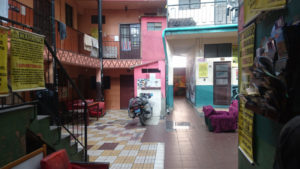 Tuesday came and I didn’t really feel like getting up and packing. I didn’t really feel like doing anything else either, so I stopped thinking about it and got up, showered under lukewarm water in the cold air, packed and stacked the bike ready to go.
Tuesday came and I didn’t really feel like getting up and packing. I didn’t really feel like doing anything else either, so I stopped thinking about it and got up, showered under lukewarm water in the cold air, packed and stacked the bike ready to go.
Gabriella was on the second-floor balcony cleaning the floors and I went upstairs to give her a goodbye hug. On the way down I met my German neighbour, Jorg Berger, who writes a blog at www.http://wiedervoll.de/. We hadn’t really talked before but he was fascinated by the freshly packed bike. We shared notes about being chased by dogs and how to deal with them before I finally squeezed the bulging panniers through the hostel door and rode out into the cobbled streets of La Paz. I was on my way…
